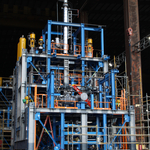The company’s refineries ran at an average of 93% of combined capacity in the second quarter of the year, the company said on Wednesday in a statement released ahead of a conference call with investor analysts.
The gasoline-producing fluidic catatlytic cracker (FCC) at the company’s 285,000 bpd Bayway refinery in Linden, New Jersey was back in full production on July 20, said Richard Harbison, executive vice president of refining.
The 145,000-bpd FCC was shut on June 8 for repairs, Harbison said.
The company continues to expect its Rodeo, California refinery will be fully converted to the production of renewable diesel in the first-quarter of 2024 when it is scheduled to begin commercial operation, Harbison said.
Phillips 66 Chief Executive Mark Lashier said the company continues to seek the best options for its 139,000-bpd Los Angeles refinery in the “politically challenging” California marketplace.
“It is, frankly, a difficult environment,” Lashier said. “And it’s been very publicly, politically challenging there, whether it’s EV (electric vehicle) mandates. But we believe that it’s going to be challenging for California to implement their aspirations around EVs so I think that may be overplayed.”
California officials have said they want 100% of new vehicles by 2035 to produce zero emissions.
Phillips 66 owns nine refineries and is a 50% co-owner of two others in the United States. The company is the nation’s fourth largest refiner, according to the U.S. Energy Information Administration.
Share This:
Next Article






